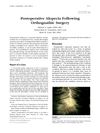Case Presentation: Catastrophic Decrease in Measured Oxygen Saturation Associated with Venovenous Bypass During Liver Transplantation
July 1999
in “
Liver transplantation and surgery
”

TLDR Oxygen levels can drop during liver transplant if bypass pressures are too high, but other reasons should be checked first.
The document from 1999 details complications in liver transplantation, noting neurological issues (19%-90% incidence), pulmonary complications (41%-98%), cardiovascular disturbances during reperfusion, and common renal dysfunction. It mentions that age and obesity don't significantly impact perioperative outcomes, though older patients have lower survival rates due to nonhepatic causes. Blood product replacement and strategies to reduce blood loss are critical, and postoperative alopecia (telogen effluvium) is linked to long surgeries but may be reduced by soft headrests and managing hypotension. A case is presented where oxygen saturation dropped catastrophically during venovenous bypass (VVB) in a transplant patient, which was fixed by rerouting the VVB return and stopping the bypass. The document concludes that desaturation in the ipsilateral hand during VVB could be due to retrograde capillary bed perfusion if inflow pressures are too high, but other causes should be considered first.




